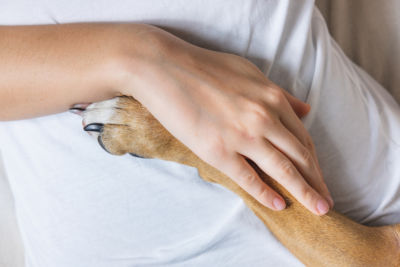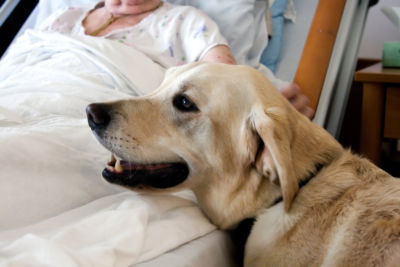What Makes a Good Therapy Dog?
A good therapy dog is a mixture of several important factors, but it mainly boils down to personality and training when it comes to these empathetic canines. The most important qualities of a therapy dog are a calm demeanor, patience, confidence and a love of human contact. There’s much more to it than that, though. If you believe your canine best friend would be a great candidate as a therapy dog, there’s a lot to consider.
 While it’s not easy to train a dog for this role, with hard work and consistency in your approach, you’ll find it to be one of the most rewarding choices a dog owner can make. Animals are a nonjudgmental presence, and their intentions can’t be misconstrued. Their instinctively heart-warming nature can be a lifesaver for people who suffer from certain conditions or have high levels of stress and anxiety.
While it’s not easy to train a dog for this role, with hard work and consistency in your approach, you’ll find it to be one of the most rewarding choices a dog owner can make. Animals are a nonjudgmental presence, and their intentions can’t be misconstrued. Their instinctively heart-warming nature can be a lifesaver for people who suffer from certain conditions or have high levels of stress and anxiety.
If you don’t feel up to the task of training a therapy dog from the beginning though, you may want to consider looking at the professionally trained and certified therapy dogs available from Pride and Prejudoodles.
What Is a Therapy Dog?
Therapy dogs have been recognized for their healing abilities since Ancient Greek times. By the 1700s, Quakers were enlisting the help of canine companions to bring love and joy to people in the earliest incarnations of hospitals for people with mental health disorders. Florence Nightingale, the celebrated social reformer and statistician, wrote several theses about how pet partners could help people not only feel better but to learn new skills and get healthier.
There is a growing body of scientific research that confirms Nightingale’s theories. Not only does interacting with and petting animals release the happy hormones dopamine and serotonin, but it also lowers blood pressure, lowers cholesterol levels and teaches empathy. In particular, a study from the National Library of Medicine showed that dogs relieve stress, fear and anxiety. Therapy dogs are nature’s little helpers for people who are unwell, elderly or in need of the kind of TLC only a cute pup can provide. What makes an excellent therapy dog is a mixture of the right temperament and considerate training.
Do Particular Dog Breeds Meet Standards Better Than Others?
Therapy dogs are regularly assessed for their basic obedience and health to ensure they meet the high standards necessary for a position of responsibility. There are no breed restrictions for these dogs; it’s temperament that matters. That said, certain breeds are known to have a predisposition for being calm and gentle.
Some breeds have a naturally laid-back personality, enjoy training sessions and are less inclined to react to other dogs.
Some breeds that are known to make great therapy dogs include:
- Corgi
- Pug
- Poodle
- Golden retriever
- Goldendoodle
- Labrador retriever
- Labradoodle
- Beagles
- Dachshund
- German shepherd
- Cavalier King Charles
- Yorkshire terrier
- Rough collie
- Pomeranian
- Greyhound
- French bulldog
- Border collie
What Traits Should a Dog Have?
Therapy dogs are used in a wide range of settings and need to possess the traits required to be emotional support companions in any of them. They all have one essential thing in common: a gentle and loving temperament. For the safety of the dog as well as the client they’re looking after, all therapy dogs need to be patient and always respond to commands — even in unfamiliar places or if there are distractions present.
The most important qualities that a dog needs include:
- Always open to interacting with strangers
- Never jumps up or paws people
- Not sensitive to rough or clumsy petting
- Walks on a lead without pulling or getting anxious
- Doesn’t display toy or food aggression
- Never demonstrates guarding behaviors
- A calm and docile disposition, no matter what’s going on
- Tolerant to unusual sights and smells that may be seen in a medical setting
- Obedient at all times
- Not afraid of unsteady or sudden movements in people
- Excellent standards of grooming
- Usually, puppies under a year old aren’t suitable, but therapy dog programs can certainly begin then.
Can I Train My Pet To Become a Therapy Dog?
As long as your puppy is healthy, it can be put to the temperament test. Therapy dog candidates undergo regular assessments to make sure they meet all the necessary criteria. There are specific attributes that your animal will be tested on, so this is where to focus your therapy dog training.
10 assessed qualities required of a therapy dog
- Supervised separation: Your canine pal must be able to handle being separated from you for short periods.
- Handling distractions: The dog must be able to focus on one task without getting distracted.
- Reacting to fellow canines: A therapy dog must be able to sit patiently while you have a quick conversation with a fellow dog owner.
- Vocal commands: Your dog must be highly responsive to your recall commands.
- Behavioral commands: Canines must promptly obey basic commands such as sit and stay.
- Walking through a crowd: It’s critical that a therapy dog walk through a crowd without reacting negatively to anyone.
- Leash behavior: Walking on a loose leash with its owner is a required quality of a therapy dog.
- Petting: The dog must be able to sit patiently while being petted and fussed over.
- Approached by a stranger: Your dog must show the ability to remain calm when approached by a stranger.
- Grooming: A therapy dog must be able to allow someone other than their owner to check their feet and ears as if they were at the vet.
Animal-Assisted Therapy Handlers Must Meet Certain Qualities, Too
There is a lot of preparation and several things to think about with therapy dogs. What makes a good therapy dog is more than personality and training, it also includes a great owner. When your dog undergoes testing, the registries will assess your skills at reading your dog’s stress and tolerance levels, as well as how you handle him. Make sure you never have to yank on their leash and ensure you’re in touch with how your canine pal feels at all times.
Can I Get Involved In Volunteering If I’m Dogless?
You certainly can! Therapy dog volunteers are dog handlers who have experience with canines and, most of all, love interacting with and bringing the best out of them. You can spend time helping to assess them, raise awareness and carry out fundraisers to help these special dogs reach their full potential.
Please bear in mind that therapy dogs and service dogs have different levels of training. No one should claim their dog is a service dog without the proper Doodle training and documentation. Both are recognized by that state and valuable members of the community. Therapy dogs certified through our organization come with an official therapy-dog vest, ID cards, ID tag and government registration certificate.
Take Home a Certified Therapy Dog After Passing the Advanced Training Program
The advanced training program available at Pride and Prejudoodles offers a therapy dog certification test so you can welcome home a certified therapy dog. We invite you to view our puppy gallery, showing our trained Goldendoodles and trained Labradoodles for sale, but be warned – they have a habit of stealing hearts when you meet them for the first time! If you’re interested in finding out more about how to buy a trained puppy to complete your family, contact us today.

